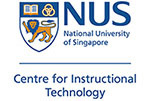
Many people in the NUS community are familiar with Turnitin, the plagiarism prevention tool for the undergraduate classroom.
NUS has added iThenticate to its plagiarism prevention portfolio. This plagiarism prevention tool, by the makers of Turnitin, is targeted at scholarly and professional plagiarism.
iThenticate enables academics, researchers and postgraduate students to check their own work. Unlike Turnitin, the submitted work is not added to a student database. This means that your submitted work does not become a source that other users' submissions are checked against.
Turnitin will remain for staff to check on students' work in a classroom situation. Unlike iThenticate, Turnitin also has additional features such as PeerMark.
The differences between iThenticate and Turnitin are summarised in the table below.
| Turnitin | iThenticate | |
|---|---|---|
| Users | For instructors to check students' work in a classroom setting. | For academic staff, researchers and postgraduate students to check their own work. |
| Access | Three methods. Log in to:
|
|
| Quick Start Guides | ||
| Features | OriginalityCheck, PeerMark. | OriginalityCheck. |
| Submissions checked against | Web pages, other content, scholarly journals, student paper database. More information. |
Web pages, other content, scholarly journals, ProQuest. More information. |
| Submissions | (By default) added to student paper database. Lecturer can change this setting. | Not added to database. |
| Submission maximum length | 100 pages or less, 20 MB or less. | 400 pages or less, 40 MB or less. |
| File types | MS Word, Word XML, WordPerfect, PostScript, PDF, HTML, RTF, HWP, plain text and MS PowerPoint. | MS Word, Word XML, WordPerfect, PostScript, PDF, HTML, RTF, HWP, plain text and OpenOffice (ODT). |
| Privacy | Privacy Pledge. | Privacy Pledge. |
There is currently no single sign-on for iThenticate. In order to use iThenticate, staff and postgraduate students will need to request for an iThenticate account.
You will receive an email from iThenticate with login details.

